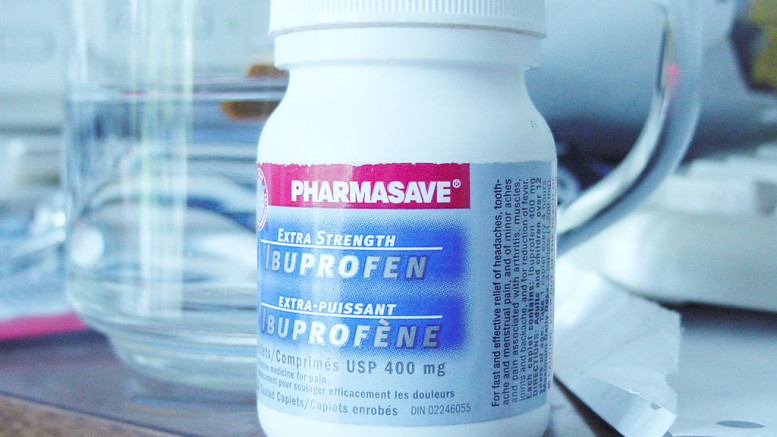Several popular media outlets touted the alleged dangerousness of ibuprofen which has been recently linked with an increased risk of heart failure. Some of them provided the public with scaringly high percentages in their headlines. The Daily Mirror, for example, massively overstated the actual numbers claiming that the famous pain-killer may increase the risk of cardiovascular attacks by up to 83 percent. What really happened, instead, is that a new vast study published in the British Medical Journal (BMJ) found evidence that associated several non-steroidal anti-inflammatory drugs (NSAIDs) with a variable risk of heart failure. However, all number and statistics must be put in perspective, because although these medications may actually be dangerous for some specific populations of patients, they’re not so dangerous as they were portrayed by many media sources.
The dangers associated with NSAIDs
NSAIDs are some of the most commonly abused medications worldwide. Most of them are widely sold as over-the-counter medications (OTC), meaning that people often underestimate their dangerousness since their accessibility in retail stores induce them into a false sense of security. A vast majority of patients who takes OTC medications often mix several painkillers at once, and the risk of a potential overdose is usually ignored. Ibuprofen, in particular, is often taken on top of other prescribed NSAIDs since may people do not know that these drugs’ effects may overlap. In 2015 the U.S. Food and Drug Administration (FDA) strengthened its warnings and indicated on all nonsteroidal anti-inflammatory drugs’ labels that these medicines may increase the chance of deadly strokes and heart attacks. So, we currently know already that taking NSAIDs can be risky, the point here is to quantify this risk by describing it with real numbers.
The results of the European study
The actual study featured in the various media outlets has been carried out by European researchers led by the University of Milan and involved over 7 million total patients. The nested case-control study funded by the European Union examined data coming from five healthcare databases coming from the United Kingdom, Italy, the Netherlands, and Germany. Researched investigated the cardiovascular safety of several NSAIDs including, but not limited to, ibuprofen, as well as several others such as naproxen, nimesulide, and indomethacin. All patients included in the databases received at least one prescription NSAID drug over the course of ten years (from 2000 to 2010). Note that all these people did, in fact, receive these medications to treat long-term conditions such as arthritis or other forms of chronic pain. Scientists found that patients who had taken any anti-inflammatory medicine in the last 14 days had a 19 percent increased chance of being admitted to a hospital for heart failure symptoms compared to those who didn’t.
Again, what many online newspapers simply failed to notice, is that there’s a significant difference between an absolute risk and a relative one. Relative risk is expressed as a percentage increase of the event happening in a group of people compared to the other. Most of the people who took these drugs were already suffering from several conditions which may also be responsible for the increased number of hospital admissions. People hospitalized were usually older (average age of 77), and many of them also suffered from diabetes, high cholesterol, and hypertension. What’s even more interesting, is that the “supposed” 83 percent increased risk was wrongly associated with ibuprofen, while in reality that percentage was the figure actually linked with another less known NSAID: ketorolac. Ibuprofen instead, was among the “averagely dangerous” medicines, with just an 18 percent increased chance of heart attack symptoms. As a final sidenote, some NSAIDs such as celecoxib or ketoprofen did not increase the risk at all.
Conclusions and recommendations
This is the first study that compares so many different NSAIDs at once, and its results are very interesting since they show that some of them are more risky than others. The European scientists noted that the risk of cardiovascular failure in people treated with NSAIDs was higher when these medicines were used for longer periods of time, and was strictly dose-dependent. They never examined the OTC versions of these medicines, but they observed that many of them are, however, available at the same doses. Although those who will be more likely affected by these heart issues are clearly the elderly and all patients who need long-term anti-inflammatory painkillers, any doctor should recommend more caution before prescribing those medications even to younger, healthier individuals.
Article written by Dr. Claudio Butticè, Pharm.D.
REFERENCES
- Corrao G, Arfe A, Scotti L et al. Non-steroidal anti-inflammatory drugs and risk of heart failure in four European countries: nested case control study. BMJ 2016;354:i4857 doi:http://dx.doi.org/10.1136/bmj.i4857
- Andrew Gregory, 29 Sep 2016. Common painkillers such as ibuprofen could raise risk of heart failure by up to 83%. The Daily Mirror. www.mirror.co.uk (Accessed October 2016)
- U.S. Food and Drug Administration (FDA). FDA Strengthens Warning of Heart Attack and Stroke Risk for Non-Steroidal Anti-Inflammatory Drugs. www.fda.gov (Accessed September 2016)
- Wilcox CM, et al. Patterns of use and public perception of over-the-counter pain relievers: focus on nonsteroidal antiinflammatory drugs. G.J Rheumatol. 2005 Nov;32(11):2218-24.
